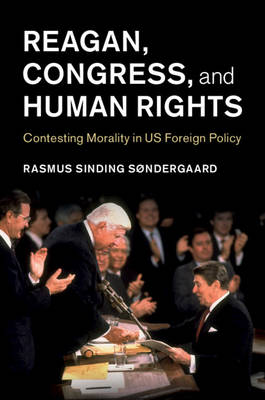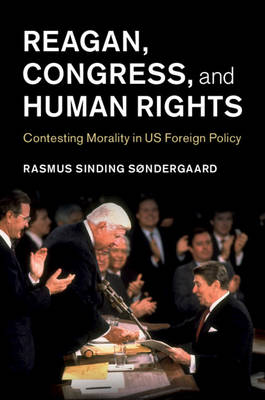
- Afhalen na 1 uur in een winkel met voorraad
- Gratis thuislevering in België vanaf € 30
- Ruim aanbod met 7 miljoen producten
- Afhalen na 1 uur in een winkel met voorraad
- Gratis thuislevering in België vanaf € 30
- Ruim aanbod met 7 miljoen producten
Zoeken
Reagan, Congress, and Human Rights
Contesting Morality in Us Foreign Policy
Rasmus Sinding Søndergaard
€ 98,45
+ 196 punten
Omschrijving
This book traces the role of human rights concerns in US foreign policy during the 1980s, focusing on the struggle among the Reagan administration and members of Congress. It demonstrates how congressional pressure led the administration to reconsider its approach to human rights and craft a conservative human rights policy centered on democracy promotion and anti-communism - a decision which would have profound implications for American attention to human rights. Based on extensive archival research and interviews, Rasmus Sinding Søndergaard combines a comprehensive overview of human rights in American foreign relations with in-depth case studies of how human rights shaped US foreign policy toward Soviet Jewry, South African apartheid, and Nicaragua. Tracing the motivations behind human rights activism, this book demonstrates how liberals, moderates, and conservatives selectively invoked human rights to further their agendas, ultimately contributing to the establishment of human rights as a core moral language in US foreign policy.
Specificaties
Betrokkenen
- Auteur(s):
- Uitgeverij:
Inhoud
- Aantal bladzijden:
- 324
- Taal:
- Engels
- Reeks:
Eigenschappen
- Productcode (EAN):
- 9781108495639
- Verschijningsdatum:
- 28/05/2020
- Uitvoering:
- Hardcover
- Formaat:
- Genaaid
- Afmetingen:
- 170 mm x 231 mm
- Gewicht:
- 544 g

Alleen bij Standaard Boekhandel
+ 196 punten op je klantenkaart van Standaard Boekhandel
Beoordelingen
We publiceren alleen reviews die voldoen aan de voorwaarden voor reviews. Bekijk onze voorwaarden voor reviews.











